Hosting Node.js applications is easy, finding a completely free Node.js hosting service that is reliable is not. In this post, we will discuss 3 hosting services where you can host your Node.js applications or API for free which you should start using now. We will also deploy a demo app step-by-step on each of these 3 platforms. I wished to have found more than 3 but finding even 3 was not very easy. This post was last updated on 2025-03-27.
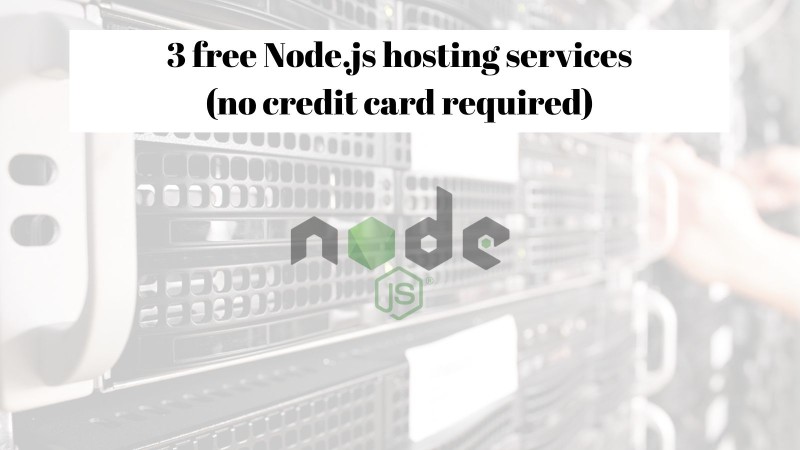
Table of contents #
- Free Node.js Hosting options
- Prerequisites
- Free Node.js hosting services
- Issues with these services
- Free Node.js hosting platforms to deploy your app
- Quick comparison of Free Node.js hosting services
- Other options for free Node.js hosting
- Conclusion
Free Node.js Hosting options #
This post is about services where you can host your Node.js application completely free, yes for $0 a month. Of course, when you don’t pay anything you will need to make some trade-offs. Still, this is not a list with just a couple of free options and a bulk of paid alternatives like the other posts I have seen and read.
I have tried all of the 3 services on my own and they work pretty well for demo and small-sized applications.
Needless to say, we would not use a free service to host a medium-sized or a production-level application. All of these 3 main services DO NOT ask for your credit card even for backup purposes so keep them inside your wallets.
I will include 3+ other services that ask for credit cards or have pretty inexpensive plans towards the end to make the list a bit more comprehensive.
Prerequisites #
All 3 of these services that we are going to look at in the next sections. Before we dive into actually deploying our Node.js applications below are some prerequisites:
- You have a GitHub account and know how to fork repositories
- Your application code is available on GitHub
- You are able to add third-party applications to your GitHub account.
Time to start revealing our free Node.js hosting services:
Free Node.js hosting services #
The free Node.js hosting services are Render (free tier), Genzio (free plan), and Koyeb. All these services can host your Node.js application for $0 a month a.k.a. absolutely and completely free. You don't even need to add a credit card for backup or safety reasons. But there are strings attached, as discussed next.
Issues with these services #
Render apps sleep if they are inactive for 15 minutes.
Or you can use something like Cron-Job.org to ping your Render service every 10 minutes to keep it awake. Render apps might take up to 30 seconds to respond after sleeping.
With completely free services there will always be some kind of limitation. For example, you will get less resources like CPU and memory. Also, you might not get a custom domain or SSL certificate for free. These restrictions are logical and acceptable for free services.
Well, that is still better than the above two options if you only have only one coding challenge to deploy.
Free Node.js hosting platforms to deploy your app #
Ok, let’s cut the rant and get to deploying a demo application. For this illustration I will use A node.js Express Tutorial with Pug.
This is a demo project to show how to build a demo app with Express js and Pug and you can find the code open-source on Github. Time to see this app hosted for free on Render.
Render #
Render is a relatively new company that used to provide only static hosting for free. Now it provides an array of free servcies including Node.js and Docker hosting. The pricing page lists static site, services, PostgreSQL and Redis for free. There is a catch for PostgreSQL though, it runs free for 90 days only.
Render has one of the smoothest developer experience and deploy the Node.js app was a breeze.
It also has comprehensive docs to help you deploy not only Node.js apps for free but a host of other languages and frameworks. Some other things you can deploy on Render are Python, Go, PHP (Laravel) and Docker. You can also host other Node.js alternatives on Render like Deno and Bun.js.
Deploy Node.js app on Render #
You will need a free account on Render to get started. After you have registered with your preferred method like Github or Email, please follow the steps below to run your Node.js app on Render:
- Login to your Render account
- On the dashboard, under "Web Services", click "New Web Service" as seen below:
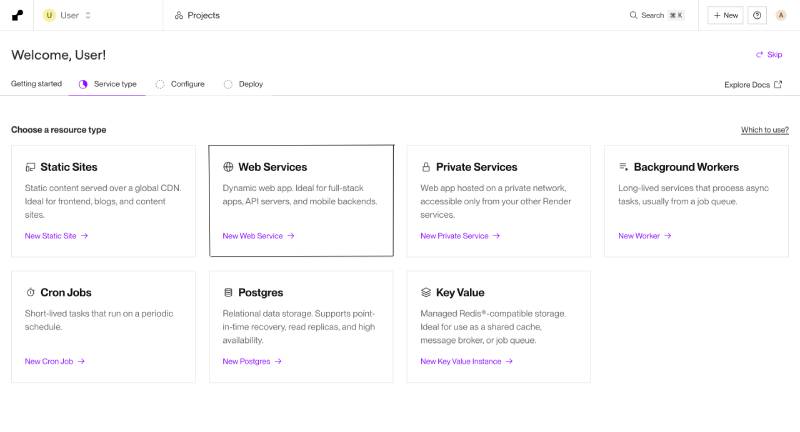
- On the next screen, choose
Public Git Repository, then paste the following GitHub URL:https://github.com/geshan/nodejs-express-tutorialand clickConnectas seen here:
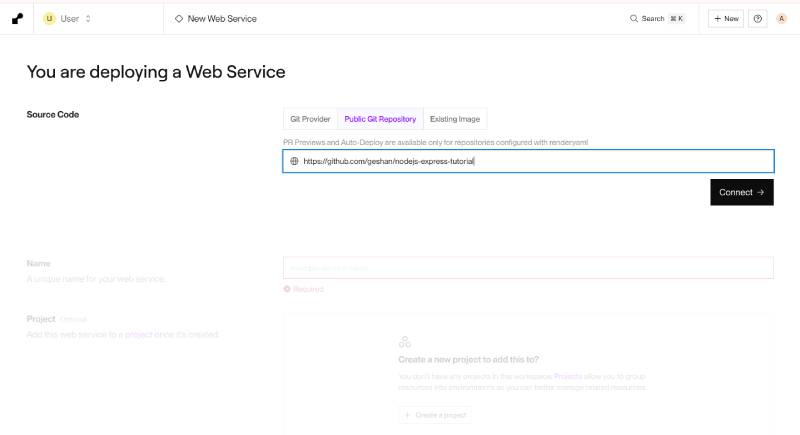
- On the next page, type in
nodejs-express-tutorialas the name of the app, and set the language toNode.
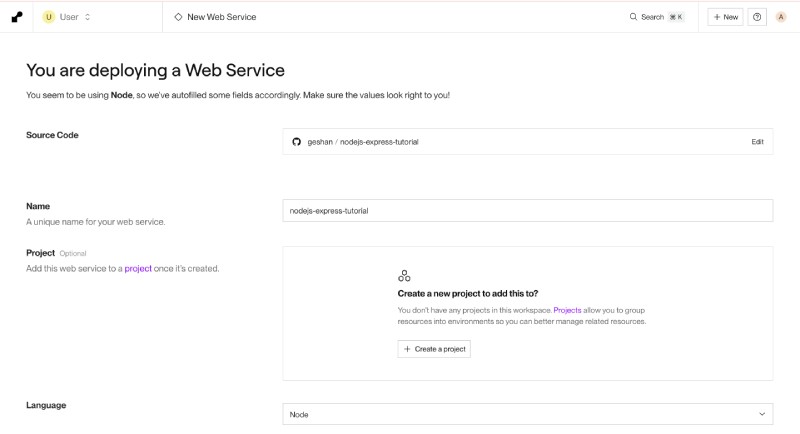
- On the same page, make sure the build command is
npm installand the start command isnode index.js. Also make sure the plan isFree.
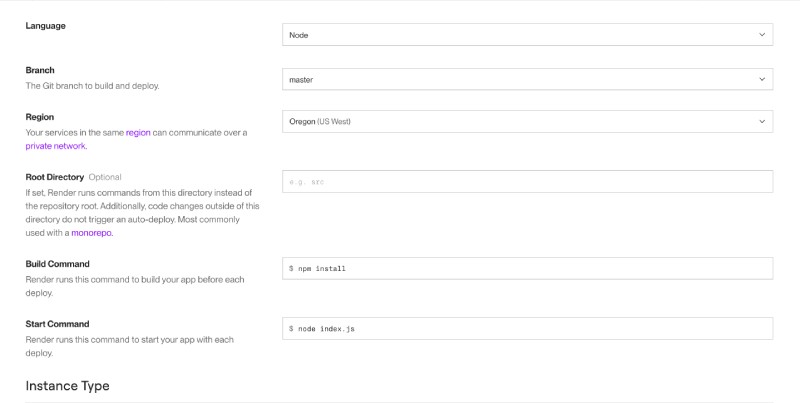
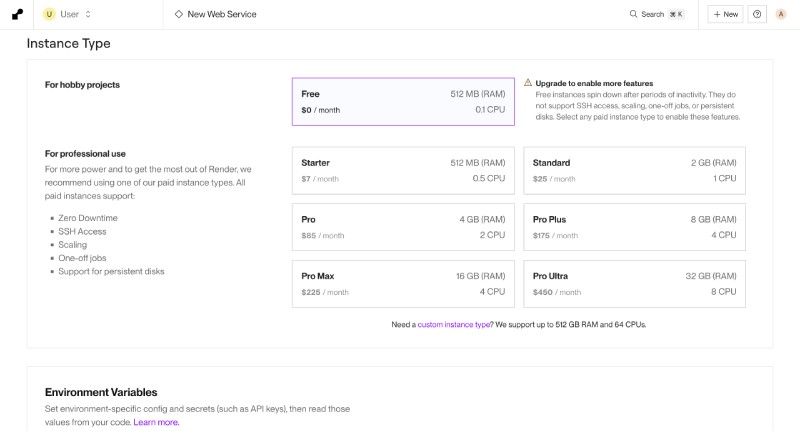
- Then click the white
Deploy Web Servicebutton at the bottom of the page.
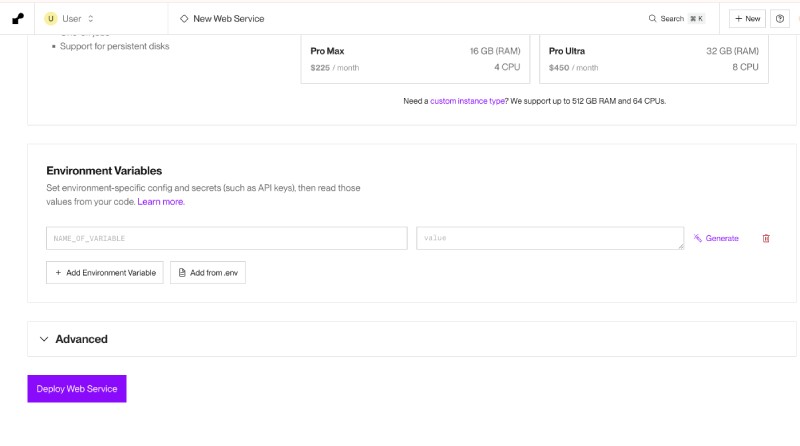
- It will take a few minutes to build and deploy. You will see an output like the one below:
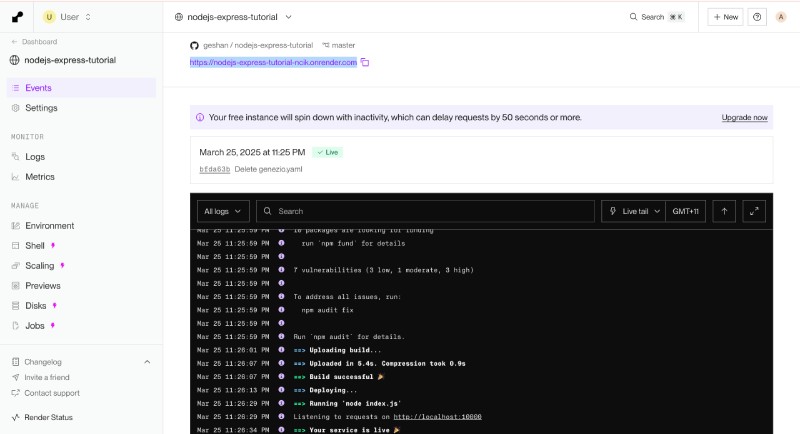
- Your application's URL will be visible under the app name. Click it to check if your app is running. If you click the link too early (while it’s still deploying), it may return a
404response. Just wait a bit — once it’s live visiting the URL will show something like this:
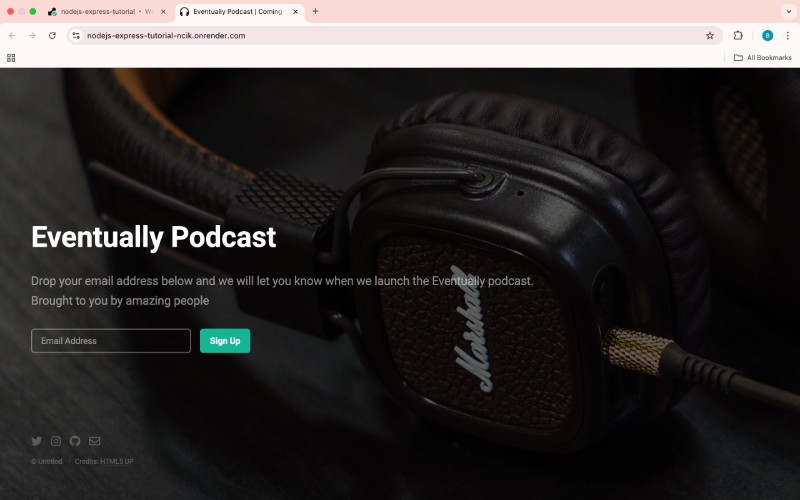
That was a quick and easy way to get your Node.js app up and running on Render. Next, let’s look how to deploy the same application on Genezio.
Genezio #
Genezio is a great place to deploy both frontend and backend apps.
Genezio Pricing is pretty straight forward. Personal projects run free and it integrates with GitHub, BitBucket, and GitLab.
Let's look at how we can deploy our Node.js app on Genezio.
Deploy Node.js app on Genezio #
Given you have registered on to Genezio with Github and are logged in, do the following steps:
- Fork the https://github.com/geshan/nodejs-express-tutorial to your GitHub account
- Go to Genezio dashboard
- Click on "Import from Github" and
- You will be asked to connect Genezio with GitHub.
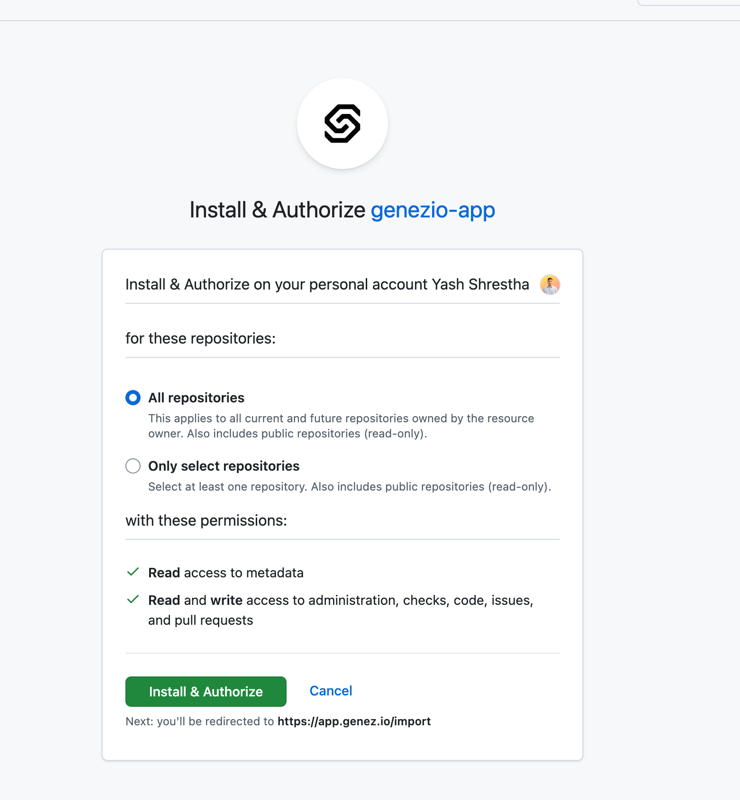
- Once connected with GitHub, search for the forked repo.
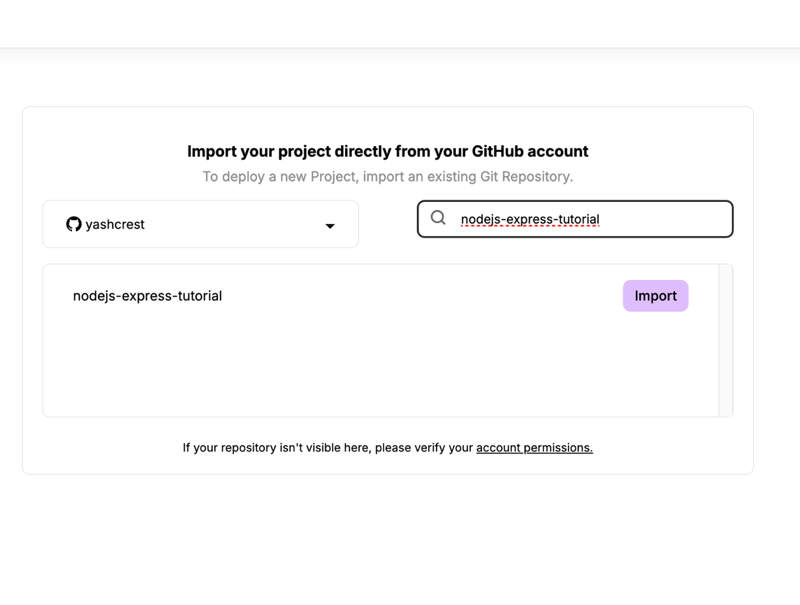
- Once the repo is imported to Genezio, if you have any Environment Variables you can add them and click "Create".
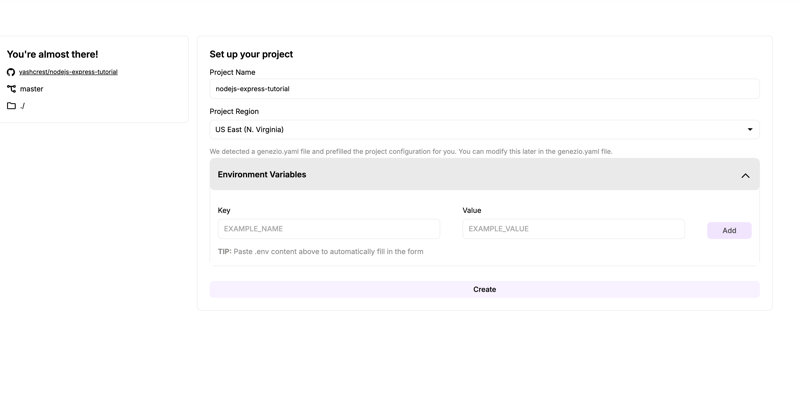
- Subsequently, Genezio will build and deploy the app for you in a live URL in a couple of minutes.
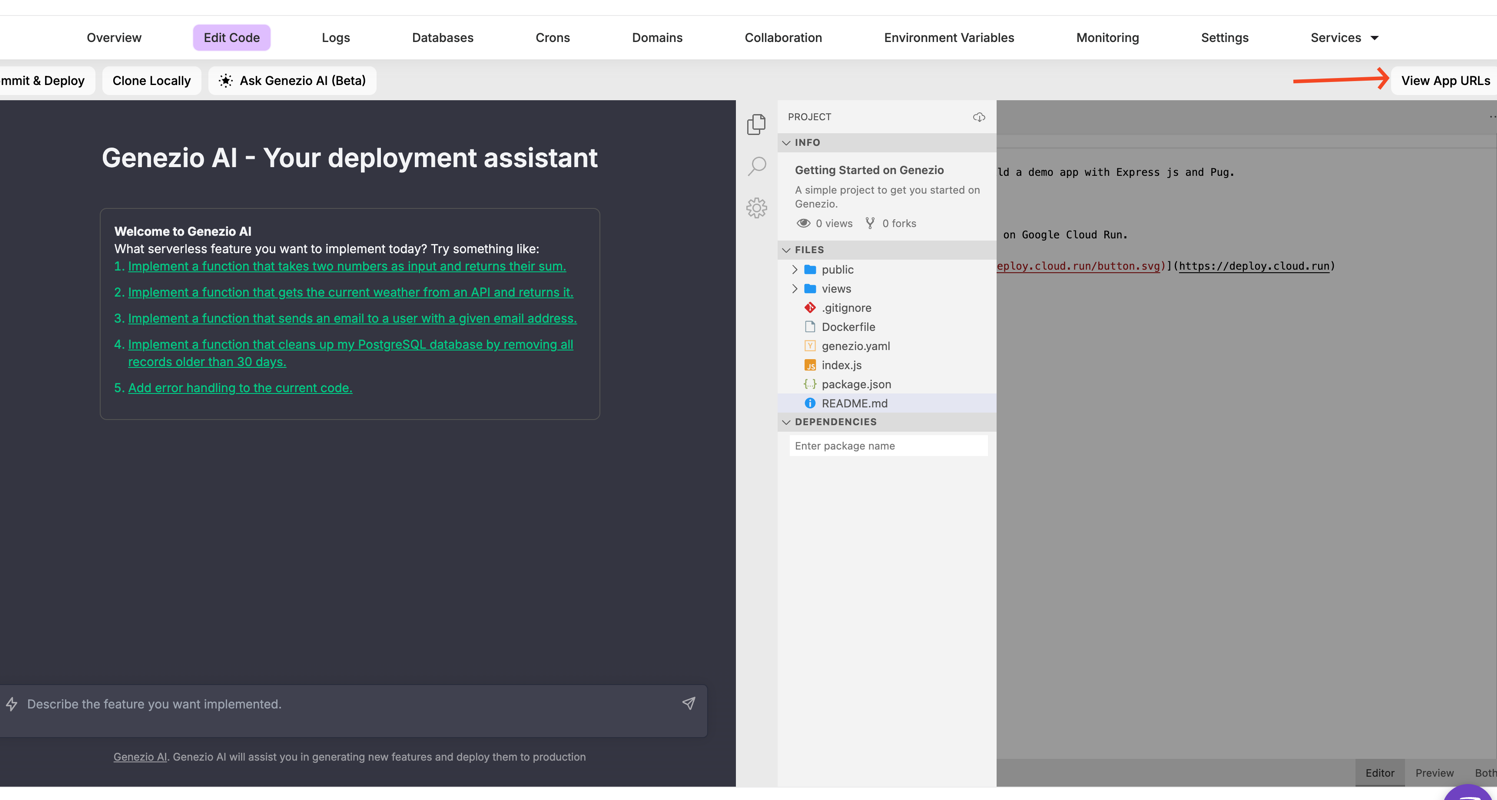
- To view the working app click on the URL on overview page
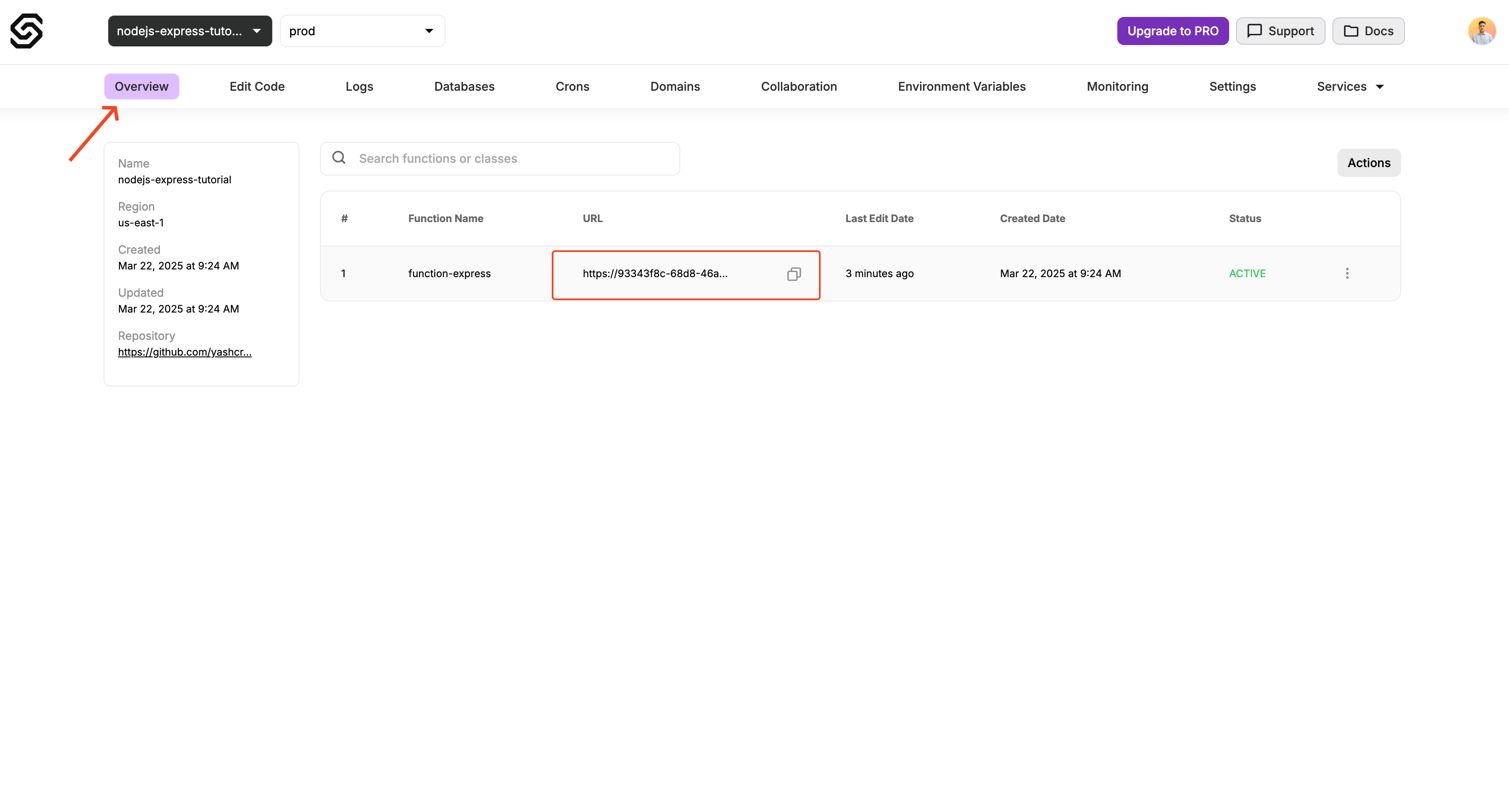
- It should come up something like this

- You can also edit your code directly in Genezio or get help on your code using Genezio AI built in.
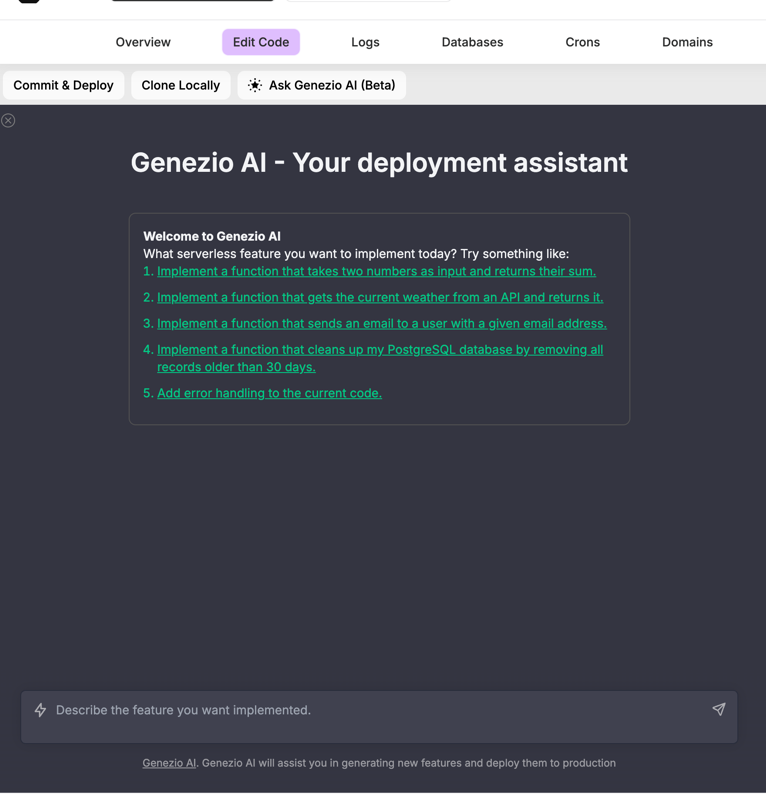
Koyeb #
Koyeb is a serverless cloud platform that
simplifies deploying and scaling applications, APIs, and machine learning models. It offers high-performance infrastructure with automatic scaling across global locations, making it ideal for AI and inference workloads. With support for various frameworks and languages, Koyeb enables developers to focus on building without worrying about infrastructure management.
Deploy Node.js app on Koyeb #
Signup with your GitHub account (preferred)
Once you're in, click on the
Create Servicebutton and then selectWeb serviceoption and then select the sourceGitHubfor our use case. You can choose other services or sources depending on your use case.
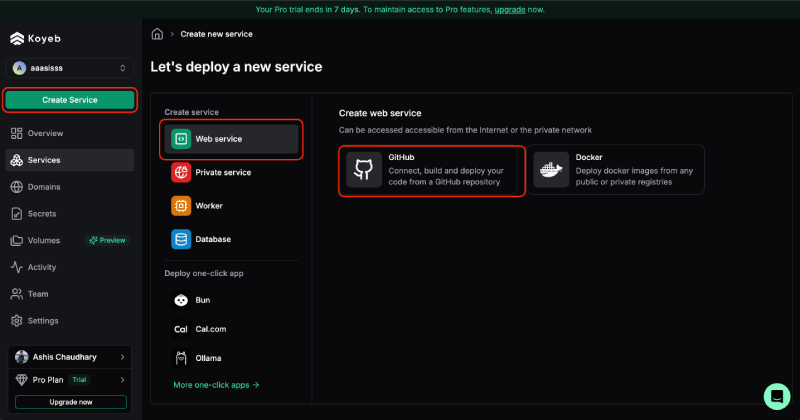
- Put the repository url manually or you can install GitHub app and then select the app from there.
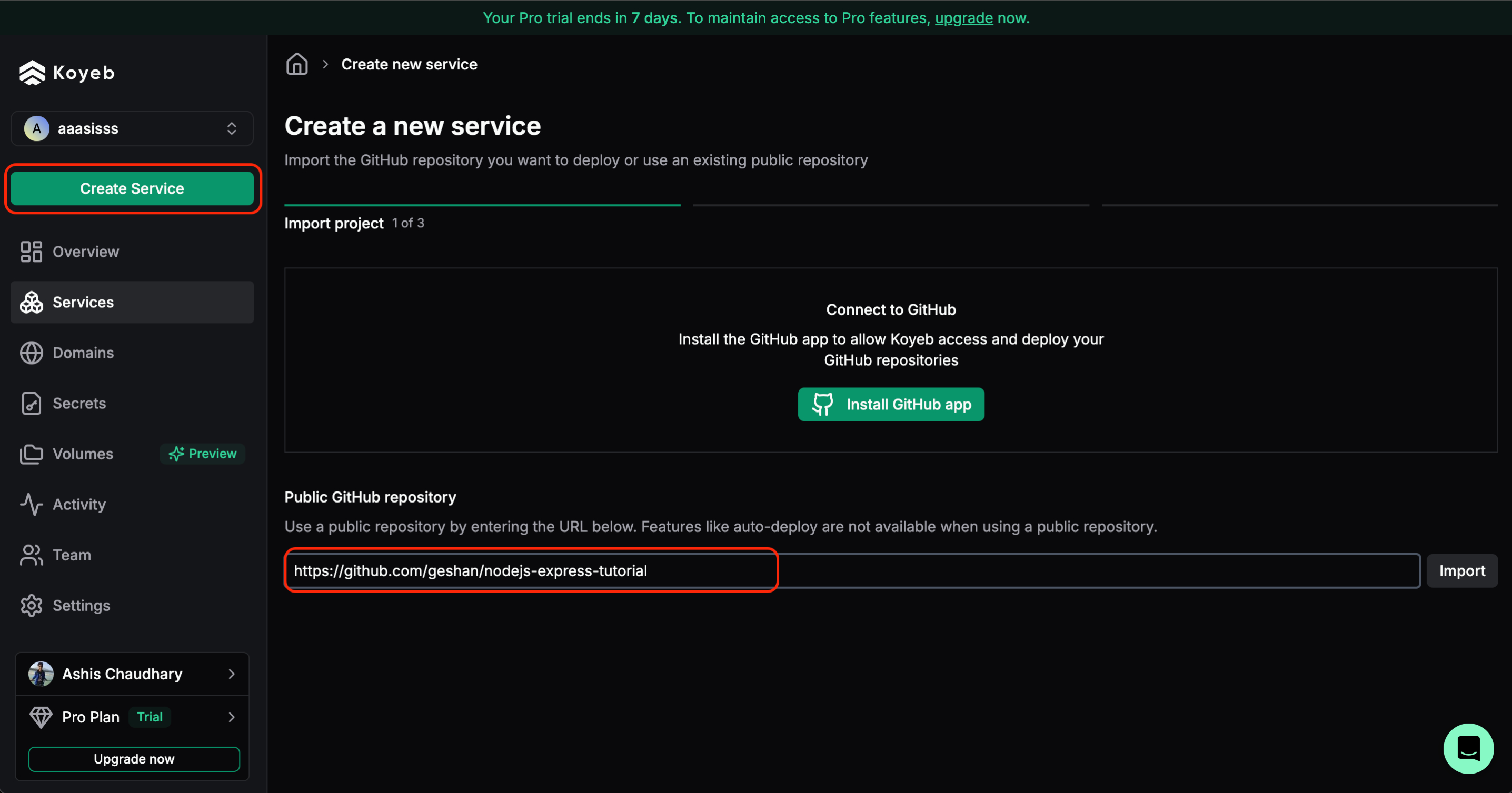
- Choose the free CPU option. There are various other options availbale for both CPUs and GPUs. You can choose those depending on your need but they're not free $$.
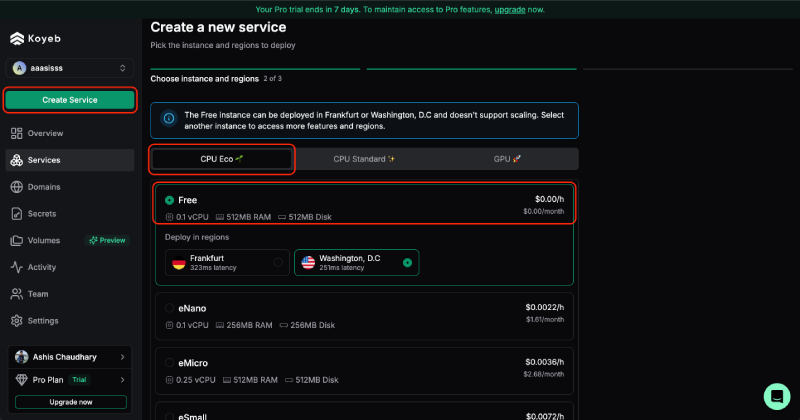
- Then you scroll down and confirm and in few minutes, you'll see this screen with the public URL to visit your app.
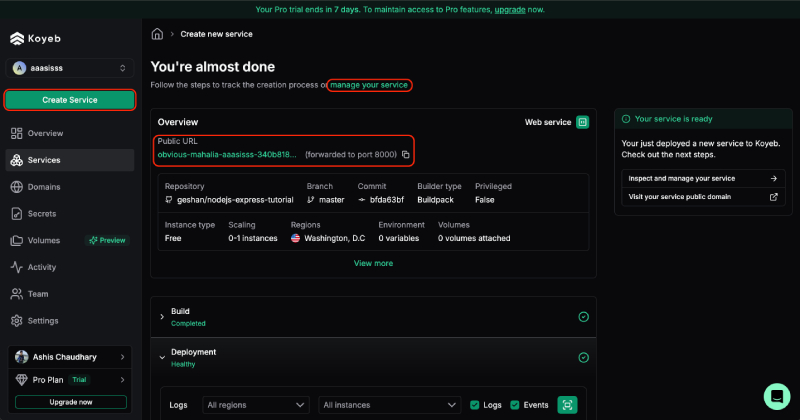
- You can click on
manage your serviceto manage the configuration if needed or go to theServicestab to see all of your services.
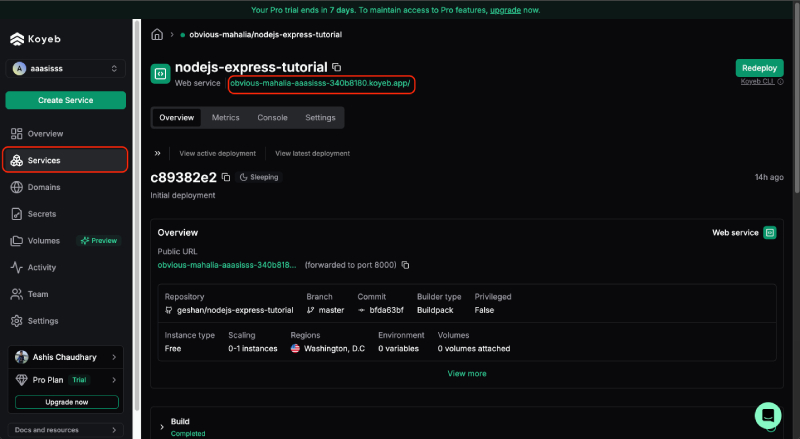
- Visit your hosted app using that public URL.
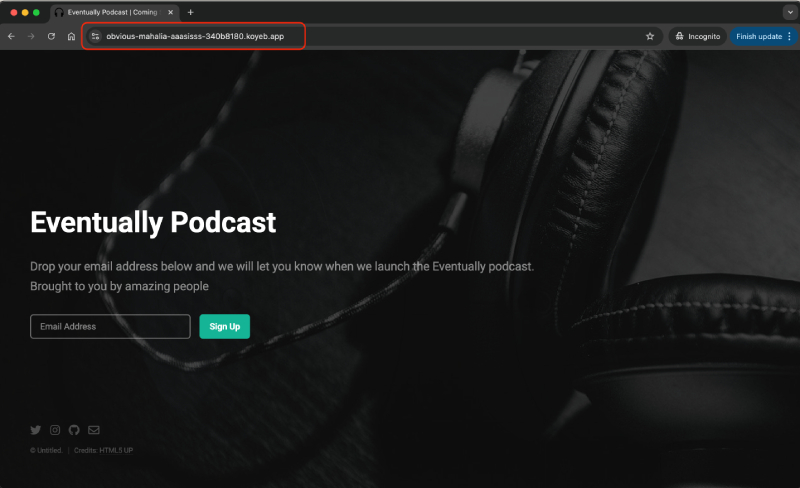
- Furthermore, you can go to
Settingtab and thenPlansto see more info about plans and pricing.
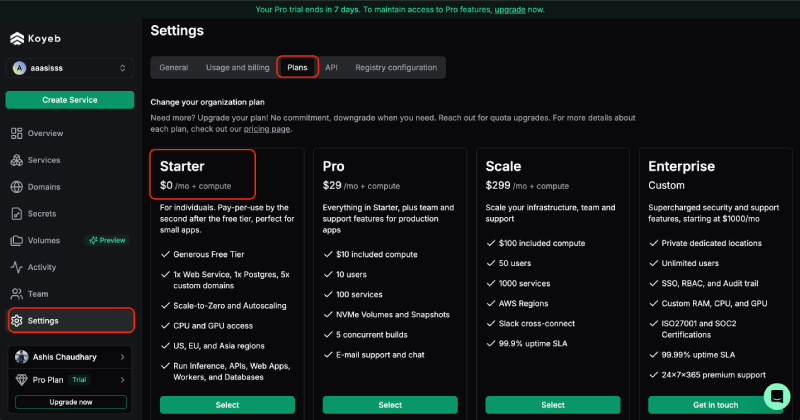
There you have it, the same Node.js API deployed on all 3 free Node.js hosting services without even needing to reach your wallet for your credit card.
Quick comparison of Free Node.js hosting services #
Below is a quick comparison table for Render, Genezio, and Koyeb.
| Feature/Service | CPU | Memory | Sleeps on no activity? | Is FAAS/Serverless? | No. of apps? |
|---|---|---|---|---|---|
| Render | N/A | N/A | After 15 mins | No | 5 |
| Genezio | N/A | 1 GB | No | Yes | Multiple |
| Koyeb | 0.1 vCPU | 512 MB | After 15 mins | Yes | 1 |
After that contrast, let’s look at some other options that are free but still ask for your credit card as a backup option that they can charge if you use more resources.
Other options for free Node.js hosting #
Some other services where you can host your Node.js application free/almost free but you need to put your credit card are as follows:
- Railway - Railway is a great service with free $5 a month. We can even run a database on Railway without adding a credit card.
- Fly.io - Pretty good, it is like CDN for the backend. The free plan has 3 shared-CPU-1x VMs with 256 MB of RAM. Asks for a credit-card on registration.
- Google Cloud Run - You can host your Node.js app on Google Cloud Run as serverless containers. You can get up to 2 million requests per month free. But it will involve setting up Google Cloud Registry and other tools. Part of Google Cloud Platform which asks for a credit card on registration.
- Glitch - Glitch can host one of your Node.js Apps for free. It is better used to code collaboratively than host a Node.js app or API.
You can host your Node.js App on all 3 of the big cloud providers AWS, Azure, and GCP and/or their function as a service (FAAS) serverless options or even on free-forever VM. But, they will ask for your credit-card.
You can even explore other cloud providers like IBM Cloud or Alibaba to host your Node.js app for $0 a month. Heroku will sunset it's free plan soon. I will leave the digging deeper part for you.
If your app needs a database, you can also use Postgres with Docker or use free services like ElephantSQL or Neon.tech.
Conclusion #
Hosting a small test project with Node.js should not be a hassle.
You should be able to do it easily with any of the above 3 services that give it absolutely free.
You can also use the other services that give it for free but ask you to put down your credit card number. The choice is yours!
